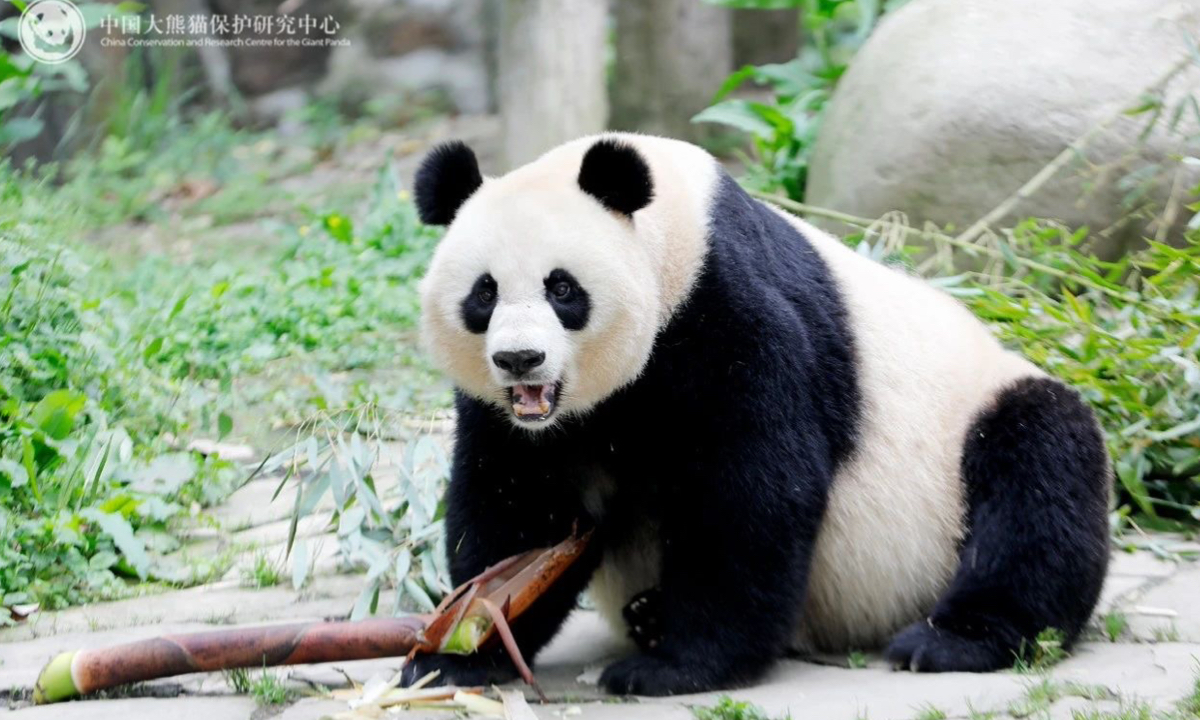
Femal giant panda Mei Xiang Photo: WeChat account of the China Conservation and Research Center for Giant Panda
The China Conservation and Research Center for Giant Panda in Southwest China's Sichuan Province opens a special column to refute rumors over giant pandas on its WeChat account on Monday.In the first two posts under the column, the center clarified that they had not sent giant pandas to the overseas for unethical experiments under the guise of international cooperation. Neither had they abused the Mei Xiang family that had returned from the US.
The purpose of our country sending giant pandas to various countries around the world for international cooperation on giant pandas is to enhance the conservation capabilities of endangered species and promote biodiversity conservation. During the period of cooperation, both parties will jointly discuss and sign research cooperation plans, determine research content and project details, and conduct scientific research on giant panda breeding, disease treatment, disease prevention and control, genetic protection, and other aspects. Major operations must obtain the approval of the Chinese side, and both parties will participate in scientific research and share the results, read the first post under the center's rumor-dispelling column on Monday.
Over the years, international cooperation units on giant pandas have fully utilized the advantages of collective experience, resource aggregation, and knowledge sharing, jointly overcoming a series of technical challenges in giant panda protection, breeding, disease prevention and treatment, and reintroduction to the wild. They have published a large number of highly valuable research papers and works, improved the health and breeding capabilities of captive giant pandas, continuously optimized the captive population structure, increased genetic diversity, and extended the average lifespan. They have significantly enhanced the technological support capabilities for giant panda and habitat protection, effectively promoting field conservation, according to the post.
Through international cooperation projects, training on the protection of endangered wildlife such as giant pandas has been provided to more than a thousand people, cultivating a large number of professional skilled talents and highly trained personnel, driving the overall improvement of global wildlife protection levels while promoting giant panda conservation. Through international exchanges and cooperation, giant pandas bring joy to people around the world, while also promoting friendly exchanges between people and becoming messengers of friendship between China and the rest of the world. International cooperation projects also play a leading role and have influence in promoting the dissemination of biodiversity conservation popular science knowledge, enhancing public awareness of protection, and promoting civil exchanges, the center said.
International cooperation on giant pandas is of great positive significance for giant panda conservation, and it is not as some netizens claim, sending them abroad for unethical experiments, the center stressed in the post.
The center also announced in a second post that the couple giant pandas Mei Xiang and Tian Tian have moved to the nursing home of the Dujiangyan giant panda base, which is not open to the public, after completing quarantine while their male cub Xiao Qi Ji is being raised at the Wolong Shenshuping base.
The center stressed that three giant pandas have adapted well to their new living environment in China. It reiterated that rumors of the center hiding and mistreating the three pandas are completely untrue.
Mei Xiang (female) and Tian Tian (male) arrived at the Smithsonian's National Zoo in Washington in 2000 and their fourth cub, Xiao Qi Ji, was born in 2020. Xiao Qi Ji's siblings returned to China when each of them was two or three years old, according to media reports.
The family
returned to China in November, 2023.
Global Times




